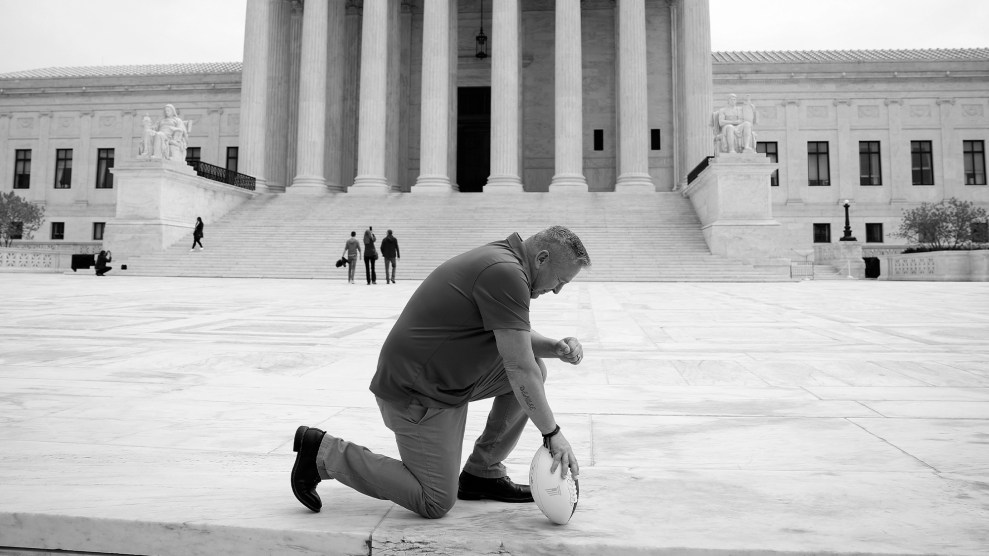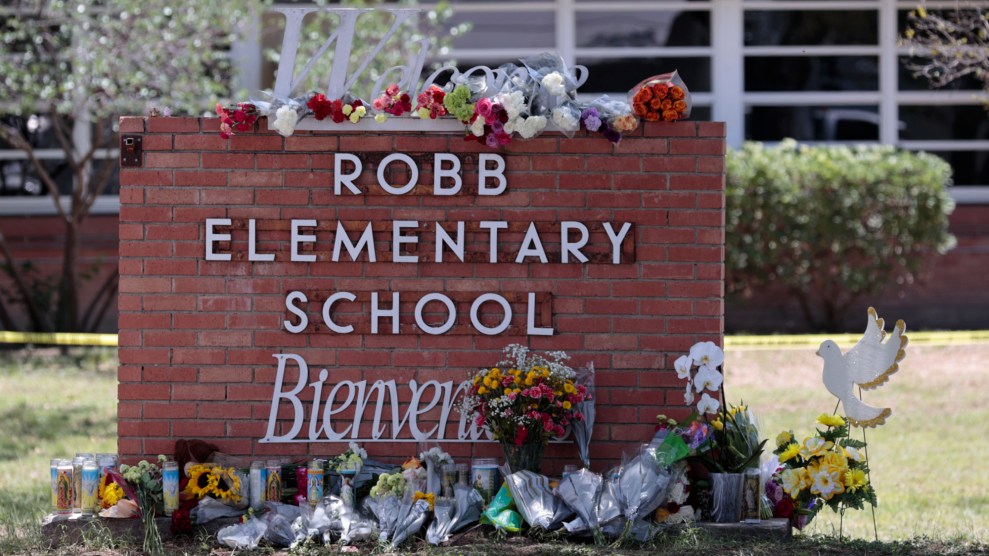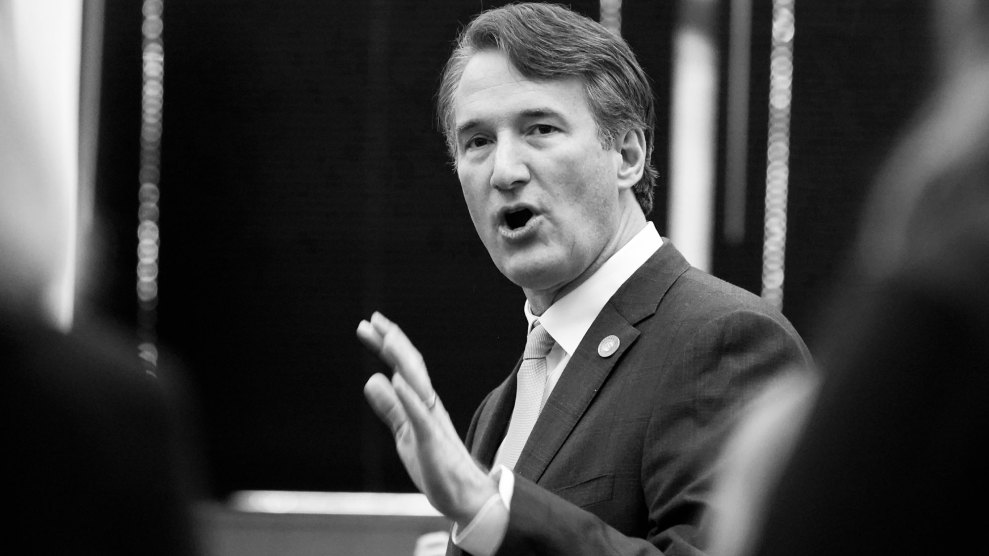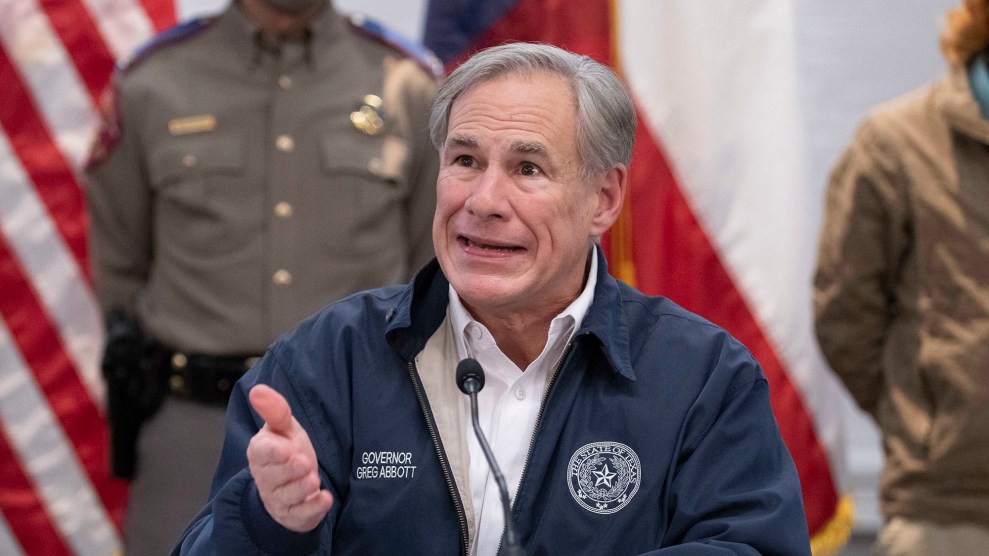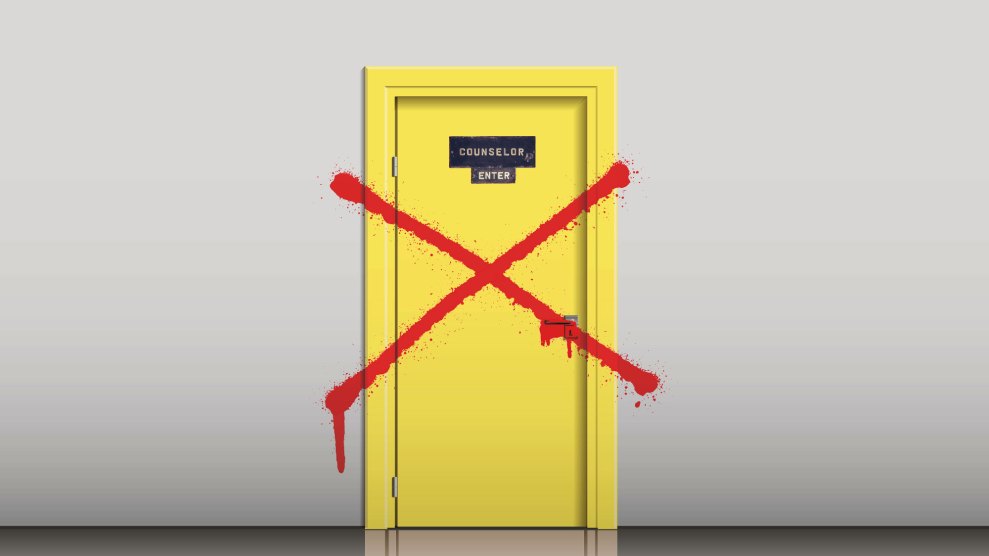
Mother Jones illustration; Getty
When Tara Kierstead finished her presentation at the annual conference of the American School Counselor Association in July, she was elated. Her slides—about how best to support students who were transgender or nonbinary—had gone over well. Colleagues came up to her afterward to tell her how much they had learned. Kierstead was well prepared for her talk: She had been a counselor at a middle school in southern Maine for a decade and had won a battle to convince her district to adopt a policy around gender inclusivity, despite the opposition of some key officials. After her presentation, “I was on cloud nine,” she recalls. Attendees told her, “’That was awesome. I want to follow you on Twitter now. And I’m gonna email you 1,000 times because I have questions.’”
But a few days after the conference, the feedback had radically changed. When Kierstead opened her Twitter DMs, she found messages from strangers who hadn’t attended the conference but who had seen her tagged in threads about it. In some of the messages, she was described as a “pedophile” and a “groomer.” Someone else accused her of encouraging students to take hormones. One went so far as to imply that she was pushing students to “cut off their genitalia.” Kierstead was shocked. “It just doesn’t make any sense,” she said, “if you know what a school counselor actually does.”
Kierstead wasn’t the only attendee who got nasty messages after the conference. Jill Cook, the executive director of the American School Counselor Association, said that members of her staff had received an onslaught of accusatory emails, ranging in tone from haughty to downright threatening. One asked, “Why are you all pieces of shit spreading hate and race-baiting? Hope you all die a painful death.” Another suggested, “Go fuck yourselves you race hustling pieces of shit.” Cook found those messages deeply upsetting. “School counselors do not indoctrinate or willfully transition students,” she said. “We want nothing more in this world than to help and support students.”
Sarah Reckhow, a professor of American politics and public policy at Michigan State University, sees these attacks as part of a more expansive far-right crusade determined to excise any hint of what they consider to be progressivism from schools. For these often paranoid ideologues, counselors aren’t just there to support a child going through a difficult time or advise on college applications. Rather, they’re agents of the woke left who have been placed in schools to spread divisive messages about racism and encourage children to switch genders.
This is a departure from the previous ways in which controversies over schools played out. Over the past few years, Reckhow, who studies politics and education, observed the nationalization of school board politics. “We used to see people following what was going on in their own communities, their own school boards,” she says. “But now we see people getting swept up in a national narrative about schools and the culture-wars issues.” Social media has played a crucial role in exacerbating the dynamic—and the viral attacks on school counselors are a good example of parents’ rights groups effectively spreading a message that has no basis in fact.
The recent attacks on school counselors appear to have originated from a few Twitter accounts that shared slides from ASCA conference presentations and claimed that the speakers were promoting dangerous ideology. On July 18, a few days after the conference, the account of a parental rights group called Courage Is a Habit tweeted, “School counselors are the biggest recruiters for the Transgender Cult in schools today. They do not get enough negative attention because parents still largely believe these counselors want what is best for their children. We’ll be changing that myth.” On July 21, Courage Is a Habit followed up with another tweet: “School counselors are the most radical department in K-12 today. They work hand-in-fist with DIE officers to drive the Transgender Cult, CRT, anti-American propaganda, & to change the culture of schools so that it that moves children away from academic excellence.” Then this tweet came from the account: “Parents this coming school year, demand that no school counselor can see your child without your presence. Most of these insane school counselors are not on the side of parental rights. They are not the same people you grew up with when you were in school.” Courage Is a Habit, a group founded by Indiana parental rights activist Alvin Lui, may have only a modest following on Twitter—about 2,000—but these tweets received hundreds of retweets over several days.
Yet the impact of Courage Is a Habit’s tirades paled in comparison to that of another infamous account, Libs of TikTok. As Taylor Lorenz reported in April in the Washington Post, the account, which traffics in outrage over what it considers buffoonish examples of liberal politics, got an early boost from podcast host Joe Rogan and now funnels content to right-wing media, including Fox News. On July 20, it tweeted out a photo of one presenter’s slide to its 1.3 million followers. The slide, which was from a session on how to combat racism in schools, showed a few talking points from Robin DiAngelo, a professor of multicultural education and the author, most famously, of the bestseller White Fragility, about the ways in which white Americans benefit from their skin color. The tweet was retweeted more than 2,000 times.
These social media attacks came only a few weeks after Fox News’ Tucker Carlson amplified another false narrative about school counselors. In a July 5 segment, he claimed that school shooters are “numbed by the endless psychotropic drugs that are handed out at every school in the country by crackpots posing as counselors.” To be clear, there is no compelling evidence that antidepressants cause children to commit violent crimes. Furthermore, physicians, not school counselors, prescribe medications.
The role of the school counselor has existed for more than a century. For most of that time, counselors focused on helping students decide what they were going to do with their lives after graduation. But that remit was never narrow. Counselors were constantly grappling with issues of equity, identity, and mental health. In 2001, federal legislation changed their title from “guidance counselor” to “school counselor,” officially broadening their role beyond the scope of college advising. Two years later, ASCA developed official standards for tens of thousands of its members across the country. Today, counselors are busier than ever—rooting out bullying, teaching organizational skills, helping children through rough times at home, and supporting students who are figuring out their sexuality or gender identity. One basic part of their work has been to combat discrimination. “We want to provide equitable opportunities and outcomes for all students,” Cook says, “particularly those who may come from marginalized backgrounds.”
ASCA’s code of ethics specifies that counselors work on behalf of students, not in service of any political agenda. Yet in powerful conservative circles, the demonization of school counselors is only gaining steam. Last month, I attended the first-ever conference of Moms for Liberty, a rapidly growing parental rights group with more than 95,000 members. During a question-and-answer session after a presentation on social-emotional learning, an attendee warned the group that school counselors “have a lot of power. And they do intervention, without your knowledge. Your kids could be having targeted intervention.”
But counselors are not the only school support figures who figure in this conspiracy; school nurses also are cast as villains. At the same session, a presenter accused public schools of tricking parents into consenting to have their children treated for conditions like gender dysphoria through school-based clinics. “Parents just think, school nurse, EpiPens,” she said. “No! They’re talking about full health care services.” Other groups have accused school nurses of secretly doling out birth control and medication for depression.
Officials from the School-Based Health Alliance, the governing group for health centers in schools, disputed all these accusations. Health centers are completely separate from the school nurse’s office, where no medications can ever be prescribed. The roughly 2,500 centers at US schools typically operate under the local health department, and they mostly serve communities where many children lack basic health care outside of school. For a student to be treated at a health center, a guardian must sign a consent form. “I have never heard of a school-based health center that is providing hormonal therapy for gender identity care on-site within the school-based health center,” said Suzanne Mackey, the group’s vice president for policy. While it’s possible that a school-based clinician might prescribe birth control or make a referral to a psychiatrist for a child whose parent had signed a consent form, rarely would this happen without parents’ knowledge, added Robert Boyd, the group’s CEO. Unless the child is in an unsafe situation at home, he said, “we encourage parental involvement in the health care of their children.”
The school counselors I talked to also said they tried to work with parents rather than against them. Yet since the beginning of the pandemic, as battles over mask mandates swept the country, parents have become increasingly suspicious of all school officials, from principals to teachers and beyond. Steve Sharp, a middle school counselor in Pennsylvania, told me that he first began to notice an uptick in complaints from parents in 2021 after prominent conservative pundits began warning that schools were teaching dangerous lessons about systemic racism. Then, earlier this year, after Sharp posted about his work in educational equity and anti-racism on social media, parents in the district complained to his superiors and the school board. His bosses supported him while also taking the concerns of parents seriously. Sharp and the administrators tried to hear them out—but eventually the barrage of accusations felt unfair and discouraging. “When it comes to building school climate and culture and having that described as grooming behavior, child abuse or criminal behavior, I take a lot of pause and concern about that,” he says. He worries that the onslaught of attacks will compound the stress of a job that is already emotionally draining, creating “oppressive conditions for these counselors and the work that they’re doing.”
In a sense, Sharp was fortunate because his school administrators supported him in negotiating parents’ complaints. But other counselors report a very different experience. Last year, Jennifer Susko was working as an elementary school counselor in Cobb County, Georgia, when parents complained about her lessons on racism. Instead of standing up for her, she says, her superiors disciplined her for thwarting the school district’s ban on lessons rooted in critical race theory. A few months later, she quit in protest. In her resignation letter, published in the Atlanta Journal-Constitution, she wrote, “My students come to me with race-based trauma and questions about their identity and experiences. The district is asking me to obfuscate history, ignore my commitment to educational justice, and deny these students voice or validation.” Susko now works as a counselor in a different district.
School counselors are already in short supply: While ASCA recommends a ratio of no less than one counselor for every 250 students, the US Department of Education reports that the average is one counselor for every 430 students. They aren’t particularly well compensated either. According to U.S. News & World Report, the median school counselor salary in 2020 was just over $58,000 a year—despite the fact that they are required to hold a master’s degree in school counseling. Cook, the ASCA head, described her colleagues’ motivations for their work as altruistic rather than financial.
Indeed Kierstead, the counselor in Maine, says that protecting students from harm is her driving force. The harassment she experienced after the conference only deepened her dedication. Over her years as a school counselor, Kierstead has developed a thick skin. She knows that ASCA has her back—the group just launched a social media campaign to set the record straight about what school counselors actually do—and to combat disinformation about them. She still worried that now that the attacks are more public, her transgender students will see them. “These kids already know that there are people who don’t support them, and that’s why the suicide rates are so high in the population,” she says. “And then people go after the people who are helping them.”

